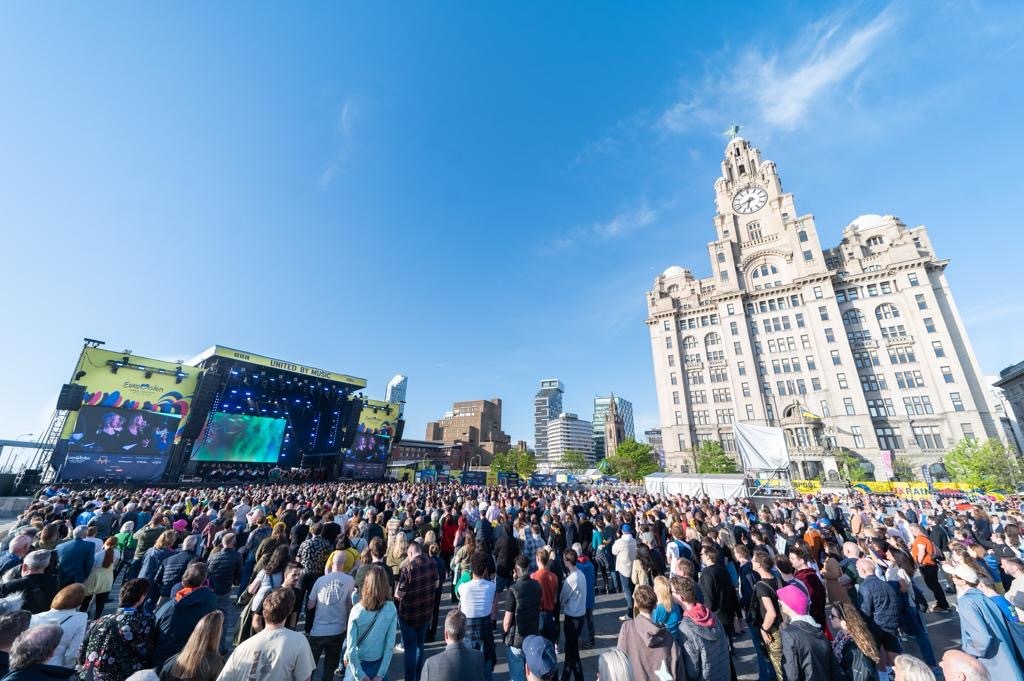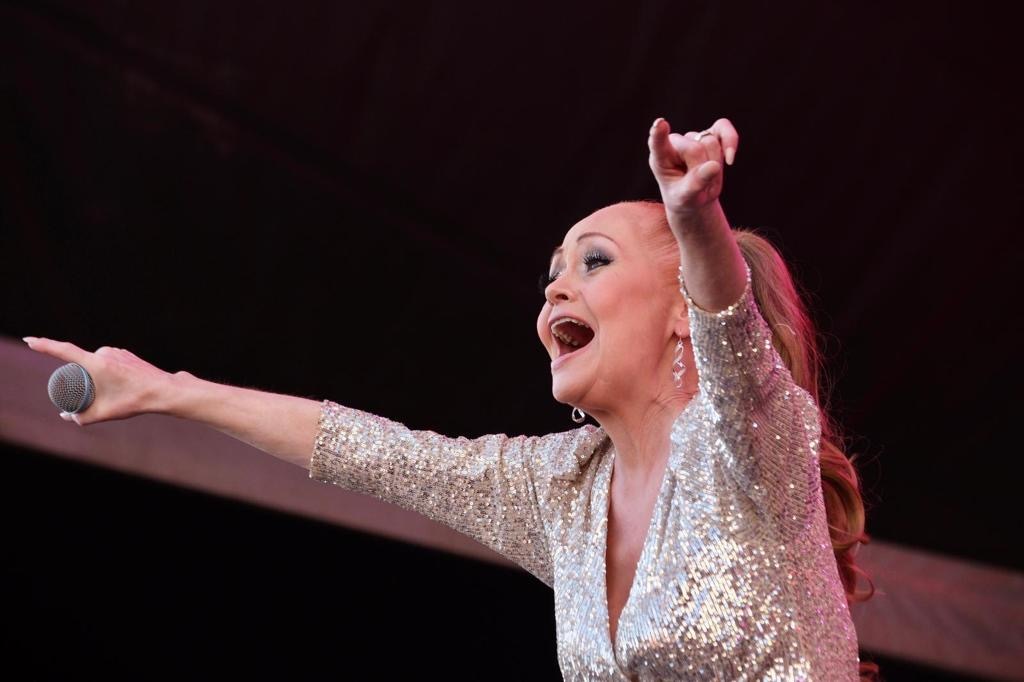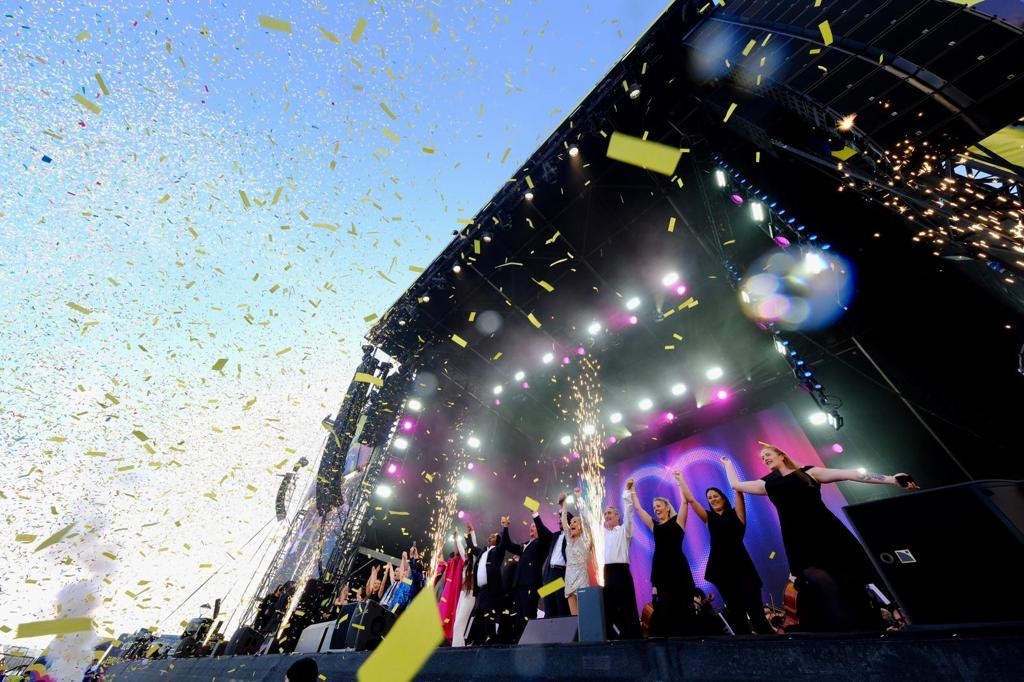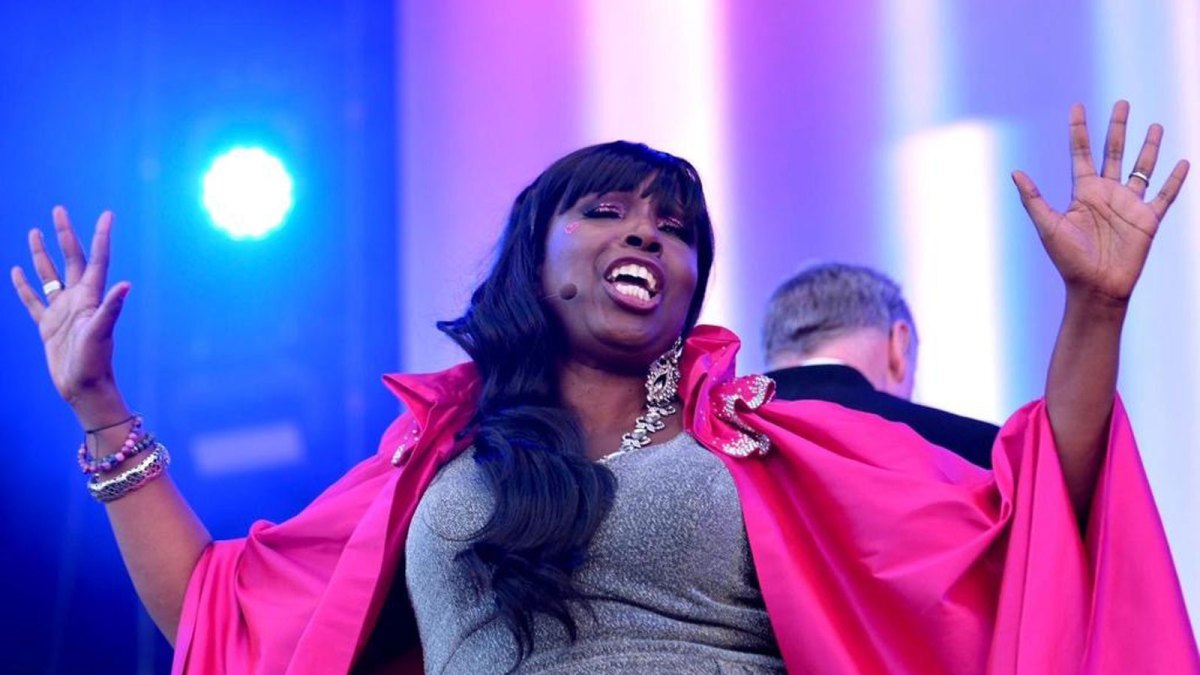It’s hard to approach events like “ENO does Eurovision” without a bit of skepticism, but I realize I might be going about things too cynically as I arrive in Liverpool in my Tár-inspired spring transition look: black trousers, black trench coat, black baseball cap, black sneakers, and a thick black jumper. I feel like a mole who has accidentally burrowed into the 1980s, as this year’s Eurovision color scheme (pink, yellow, blue, occasionally black) appears all around me: in splodges, stamps and swirls, curled into free-form hearts on Liverpudlian cheeks, and splayed onto banners stretched across unsuspecting buildings.
In the riverside fanzone, big-hatted Belgian entry Gustaph—whose track “Because Of You” is already racking up a Wrapped-troubling number of repeats on my Spotify—performs two songs, the second with a backing track that malfunctions spectacularly. Nobody really minds. It’s an extremely sunny Tuesday afternoon, and everyone has taken the time off work to sit on the grass without a care in the world. Even before the opera starts, the Scouse Glyndebourne is a hit.
Then it’s Charpentier, some thoroughly underwhelming fireworks, and national treasure/TV personality Rylan Clark, who appears as the evening’s master of ceremonies Big Brother-style on a huge screen overhead. (If this is the final form of the totalitarian overlords of the future, at least they’ll have nice teeth.) Below, a grinning ensemble takes sneaky photos of the crowd. It’s not been the happiest few months for the musicians of English National Opera—their recent productions of Jeanine Tesori’s “Blue” and Henryck Górecki’s “Symphony of Sorrowful Songs” are hardly a laugh-a-minute, plus there’s the small matter of their entire musical livelihoods unraveling—but, as a coterie of double basses lines up at the front of the stage for a photo, fears are suspended, for an hour at least.

In Susan Sontag’s Notes on Camp, she describes the camp sensibility as “disengaged, depoliticized—or at least apolitical.” It seems that Ruslana wasn’t listening. The singer, political activist, and Ukrainian Eurovision winner in 2004 also trained as a conductor at Lviv Conservatory, and the prologue to the evening’s festivities sees her conduct powerful Ukrainian music that segues into her winning track, “Wild Dances,” as the evening’s conductor Stephen Bell watches on awkwardly from about two feet away. It works, eventually, in the sort of “OK! This is happening!” way of Eurovisions past and present.
“How big should we make our confetti cannon?” asked one set of Eurovision organizers. “Yes,” replied the other. The cannon forms one of the evening’s key structural devices, proof that any architectural weaknesses in pop music (a misplaced bridge, a gratuitous key change) can be papered over by a couple of industrial-sized party poppers. But the truth is, there’s not actually too much to paper over. The selections on this vaudeville-like evening all make sense. Some, I suspect, have been chosen owing to that ancient formula, “strings = classical,” but no songs are made more “operatic” than they need to be. (Melodrama? A list of matriarchs in the chorus? Sung by an LGBTQ+ icon? “Diva” by Dana International is already so opera.) The orchestra and chorus rattle through tunes quickly, so even the soupiest ballads are clipped short. The tempo is high, and the vibe is extravagant and silly. I love it.
The latest from VAN, delivered straight to your inbox
I sometimes feel that Eurovision is a little like “The Hunger Games,” with victors guaranteed a berth for life in the endless Eurovision carousel. Scouse singer Sonia (UK, second place, 1993) must have rejoiced when this year’s events came to her hometown: she comes through with her bouncy hit “Better The Devil You Know.” So does 1992 winner with “Why Me,” Linda Martin. “I look at you and I ask myself, why me?,” she sings, predicting the words of every journalist knowing that the last train home is three times as long as the event you’re going to see.

What English National Opera does well in these “one-off” events—though expect more of them as they move outside the capital—is engage casts and associates from recent productions, rather than a group of cobbled together freelancers performing as ENO for one night only. Performing Kate Miller-Heidke’s Delibes-ish “Zero Gravity” to a group of slightly bemused Eurovision revelers is probably the weirdest gig that recent ENO singers Ellie Neate and Ella Taylor will do in a long while, but it goes off, as both try gamely to imagine what “zero gravity” might mean for opera singers working within budget restraints.
One man who seems permanently in his own orbit is tenor Russell Watson. Perhaps the only classical music star to have entered the phonebook of the Loose Women producers, the self-styled “People’s Tenor” (who are these people?) tells us that “you’re my choir tonight,” an irony not lost on the ENO Chorus sitting behind Watson—who, if the company does end up moving, might well be replaced by audience members. He sings what he knows best: light Italian fare, owing to that other ancient formula, “another language + vibrato = opera.”
With its future far from certain, ENO is never too far from an outbreak of poignancy, and this evening is no different, with Conchita Wurst’s showstopping 2014 007-esque “Rise Like A Phoenix” given over to the company’s extremely game chorus. That the detail of the words isn’t heard over the powerful if slightly misdirected noise is a little on-the-nose given the recent discussions over the company’s future funding plans. (If we had heard the lyrics, the chorus would have continued yet another Eurovision tradition: barely disguised—though not entirely cogent—political rage. “Rise like a phoenix / Out of the ashes seeking, rather than vengeance: retribution.” Arts Council England, are you listening?)

Other things go a little awry. The seemingly obligatory Riverdance section … happens, with sluggish tempos too luxurious for those steeped in the lithe sound of Irish vocal group Anúna’s original performance from 1994 (is it too much to ask an opera chorus to take the afterburners off, just for one section?). The dancing is probably good, but the troupe’s feet are obscured by the monitors on stage, so it’s hard to be sure. Instead, we get six minutes of lightly bobbing torsos and faces deep in concentration.
But then it gets better and better, until I’m scared our impeccably dentured despot will tell us we’ve come to the last number. The costume changes prompt yelps normally reserved only for when characters in “Emily in Paris” turn up to their silly little social situations in increasingly outrageous couture: countertenor Collin Shay wears a stunning green dress and heels for “Diva,” and a sparkly silver vest, short shorts and long boots for Sam Ryder’s “Spaceman”; Nadine Benjamin singing Loreen’s Eurodance anthem “Euphoria” in an enormous fuschia cape might be the campest thing I’ve ever seen.
This all feels like ENO letting off some steam. For an hour on a Tuesday afternoon in May, a group of musicians, blissfully under-rehearsed and with a few wobbles here and there, perform without a care in the world. You have to grasp moments of joy when you can at the moment, and, for a brief time in the Merseyside sunshine, I simply do not want it to end. ¶
Correction: A previous version of this article stated: “Domenico Modugno’s “Volare” never featured at Eurovision, but it did appear in the 2003 Hilary Duff masterpiece, “The Lizzie McGuire Movie.” Modugno’s “Volare” was, in fact, Italy’s entry for Eurovision in 1958, under the title “Nel blu, dipinto di blu.” It was also, as previously stated, featured in the 2003 Hilary Duff masterpiece, “The Lizzie McGuire Movie.” VAN regrets the error (but does not regret watching “The Lizzie McGuire Movie”).
Subscribers keep VAN running!
VAN is proud to be an independent classical music magazine thanks to our subscribers. For just over 10 cents a day, you can enjoy unlimited access to over 875 articles in our archives—and get new ones delivered straight to your inbox each week.
Not ready to commit to a full year?
You can test-drive VAN for one month for the price of a coffee.

